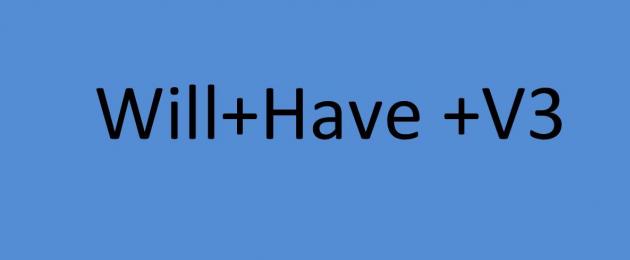The future perfect tense is used to express an action that will take place at a certain point in the future.
- She will have cleaned the entire house by the time he gets home. She will clean the whole house for his return.
- They will have finished their course by the end of May. They will complete the course by the end of May.
Education time

The future perfect tense is formed using an auxiliary verb will have +V3(3rd form of the semantic verb (see table of irregular verbs)). If the semantic verb is correct, an ending is added to it -ed.
- By the time I finish this course, I will have taken five tests. When I finish this course I will write 5 tests.
NB! To form an affirmative form of a sentence, it is possible to use the auxiliary verb shall have for the 1st person (I, we - I, we). Using will be for the 1st person is not a mistake!

Negative sentence formed with an auxiliary verb will not have(shall not have) (won’t/shan’t - shortened forms)+ V3.
- I shall not have finished this test by 2 o'clock. I won't finish the test by 2 o'clock.
- She will not have graduated from university by next year. She won't graduate by next year.
For education interrogative sentence the verb comes first in the sentence will/shall + pronoun (subject) + have + semantic verb in the third form (V3). If an interrogative sentence begins with a question word (What? Who? When? Why? Which? Whose?), then the verb will/shall takes second place in the sentence, the pronoun takes third place, etc.
- Shall I have finished this test by 2 o'clock? Will I finish the test by 2 o'clock?
- Will you have graduated from university by next year? Will you graduate by next year?
Signal words (time markers, cue words)
- by - before, to;
- by then - by that time;
- by the time - by time (by the moment);
- after - after;
- before - before;
- until - not yet (in negative sentences), etc.
 The Future Perfect Tense. Exercises
The Future Perfect Tense. Exercises
 The Future Perfect Continuous Tense. Use and education of time
The Future Perfect Continuous Tense. Use and education of time
 The Future Simple Tense. Use and education of time
The Future Simple Tense. Use and education of time
- Future Perfect Tense (perfect future tense)
- Rules for forming time, signal words
- Example sentences with Future Perfect Tense
USE
The Future Perfect tense is used to express an action that will take place at a specified moment in the future (by tonight, by the end of the year, before, and so on).
I will have moved to a new apartment by the end of the month.
By the end of the month I will have moved to a new apartment.
At the same time, it is important for us to emphasize the end of the action.
EDUCATION TIMEFUTUREPERFECT
Let's look at the formation of the affirmative, negative and interrogative tenses of the Future Perfect.
The affirmative form of the Future Perfect is formed using the auxiliary verb to have in the future tense, namely ‘ will have’ and a past tense verb, i.e. verb ending -ed, or the 3rd form of irregular verbs - participles 2:
She will have arrived at the station by tonight.
She will arrive at the station in the evening.
They will have built a new house by the end of the year.
They will complete the new house by the end of the year.
In the negative form to the auxiliary verb will particle is added not, which has the short form won’ t.
Future Perfect Tense (pronounced future perfect tens) is translated into Russian as the future perfect tense. Future Perfect Tense is one of four existing futures.
This tense is used quite rarely, but denotes a certain action that must be completed before a certain moment/the beginning of another action in the future or will continue after it.
Education Future Perfect
The Future perfect tense can be formed in two ways:
Using the auxiliary verb will or using the construction be going to. Future Perfect differs from Future Simple in that here the two are used interchangeably.
1. will have + pr. past tense (irregular verb (3rd form) or regular verb ending -ed)
You will have perfected your Finnish by the time you come back from the Finland - You will have learned Finnish perfectly by the time you return from Finland.
Clare will have finished her homework by the time her brother Bob gets home - Clare will finish her homework by the time her brother Bob gets home.
2. be + going to have + pr. past tense (irregular verb in 3rd form or regular verb ending -ed)
You are going to have perfected your Finnish by the time you come back from the Finland. – You will learn Finnish perfectly by the time you return from Finland.
Clare is going to have finished her homework by the time her brother Bob gets home - Clare will finish her homework by the time her brother Bob gets home.
Negative Sentences in Future Perfect
You can make a negative sentence in the future perfect tense by adding the negative particle not to the auxiliary verb will:
Statement: She will have learned every road sign - She will learn every road sign.
Negation: She will not have learned every road sign - She will not learn every road sign.
Statement: It will have stopped raining - The rain will stop falling.
Negation: It will not have stopped raining - The rain will not stop falling.
Negation with the construction be going to is constructed by substituting the negative particle not between be and going to:
Free lesson on the topic:
Irregular English verbs: table, rules and examples
Discuss this topic with a personal teacher in a free online lesson at Skyeng school
Leave your contact information and we will contact you to sign up for a lesson
Statement: They are going to have left Uruguay - They will leave Uruguay.
Negation: They are not going to have left Uruguay - They will not leave Uruguay.
Statement: Guys are going to have met Alexandria - The guys will meet Alexandria.
Negation: Guys are not going to have met Alexandria - The guys will not meet Alexandria.
Word order in a negative sentence:
Subject + will not / be not going to + Have + Action verb + Rest of sentence
Our music teacher will not have retired by next semester - Our music teacher will not retire by next semester.
Our music teacher is not going to have retired by next semester - Our music teacher will not retire by next semester.

Interrogative sentences in the Future Perfect
I will have been in London for six months by the time I leave - I will have been in London for six months by the time I get ready to leave.
By Monday, Susan is going to have had my book for a week - On Monday it will be a week since Susan reads my book.
Complex cases
Like other future tenses, the Future Perfect is not used in sentences that begin with a specification of time:
while - while
when - when
before - before
by the time - by that time
after - after
as soon as - as soon as
if - if
unless - for now
and etc.
In such cases, the Present Perfect is usually used instead of the Future Perfect.
Video about Future Perfect:
The future perfect tense is far from the most common tense form of expressing future events in English speech, since the scope of its use is quite narrow and specific. The predicate used in the Future Perfect form helps to express the fact that by a certain moment in the future the action will be completed, over. Consider the following example:
The example given shows a time gap between one action in the future ( we get to the cinema/we'll go to the cinema) and others ( the film will have started / the film will already begin). As can be judged from the given context, Future Perfect Tense serves to denote precedence in the future, it is a kind of “past in the future.” Well, now let's talk about everything in order.
Affirmative sentence
In order to understand the principle of the formation of sentences with a predicate in the future perfect tense, it is enough to know the features of the formation of tenses and, since this form combines elements of these two tense forms: auxiliary verb will and perfect infinitive (Infinitive Perfect) – haveV 3(where V 3 is the third form of the semantic verb or, in other words, the past participle).
will haveV 3
| Sarahalways leaves for school at 7.30 in the morning, so she won’t be at home at 7.45 a.m. She'll have gone to school. | Sarah always leaves for school at 7.30 in the morning, so she won't be home at 7.45. She will go to school. |
| Next year Paul and Jessica will have been married for 40 years. | Next year there will bePaul and Jessica have been married for 40 years. |
| Ann usually has lunch at 12.30. It takes her about half an hour. So, at 1.15 she'll have already finished her lunch | Ann usually has lunch at 12.30. It takes her about half an hour. Therefore, at 1.15 she will have already finished her lunch. |
| I’m packing my suitcases for the journey. The taxi will come in two hours. By the time the taxi arrives I'll have packed my suitcases. | I'm packing my bags for the trip. The taxi will arrive in two hours. I'll have my bags packed by the time the taxi arrives. |
Negation
To form a negative sentence with a predicate in the Future Perfect, you need to add the negative particle not to the auxiliary verb will. This will result in the following construction as a result of merging and abbreviating words:
won't have V 3
Questions
Different types of questions in the future perfect tense are formed, as in other tense forms, due to the base of the general question. General question, which is characterized by the absence of a question word and the need to answer Yes/No, is formed by setting the verb will before the subject.
| Will + S + have V 3...? | Will John have repaired his car by the time Jane returns from her work? –Yes, he will. | Will John have repaired his car by the time Jane gets home from work?- Yes. |
| Will you have had your breakfast at 8 o’clock? –No, I won't. | Will you have had breakfast by 8 o'clock?
- No. |
Special question It is distinguished by the presence at the very beginning of the sentence of a question word or interrogative construction, for example:
Alternative question containing a conjunction or/or, placed between two or more choice objects, is constructed identically to the structure of a general question, for example:
Question to the subject as a type of special question, it is distinguished by the apparent absence of the subject itself in the structure of the question, because the subject here is expressed by a question word Who (who)/What (what) , For example:
As can be judged from the last example, What can appear not only in the meaning of “what”, but also in the meaning of “which” in combination with a noun or a phrase containing a noun. Such a question will also belong to the group of questions to the subject.
Separated question, which usually helps to doubt the content of a certain sentence, consists of an auxiliary verb in the form won't And subject represented by a personal pronoun , if the base sentence does not contain a negation, for example:
and an auxiliary verb in the affirmative form will followed by a subject expressed by a pronoun if the base sentence contains a negation, for example:
Use
An action that will be completed completely by a certain point in time in the future or before the start of another action in the future - this is the only scope of application of the Future Perfect. Often such a limitation of one action in the future by another later action is indicated by the preposition by (to, to), by the time (by the time), before (before) , For example:
The future perfect tense, to some extent, is opposed to the future continuous (Future Continuous), which can be seen in the following table:
| Future Perfect (will have V 3) | Future Continuous (will be Ving) |
| an action in the future will end at a certain point | action in the future continues at a certain point |
| Phone me after 8 o’clock. I'll have finished dinner by then. | Don’t phone me between 7 and 8 p.m. I'll be having dinner then. |
| Call me after 8 o'clock. By then I will have finished dinner. | Don't call me between 7 and 8 pm. Then I'll have dinner. |
The future perfect tense is not very actively and variedly represented in sentences in English speech, but it is quite simple to form and use.
Affirmative form The Future Perfect is formed using the auxiliary verb to have in the simple future tense (Simple Future/Future Indefinite: shall/will have (shall for 1st singular and plural, will for all other singular and plural persons. ) and the past participle (Participle II) of the semantic verb.
shall have, will have + Participle II
I shall have written the letter. I will write a letter.
He will have written the letter. He will write a letter.
IN interrogative form auxiliary verbs shall/will are placed before the subject.
Shall I have written the letter? I will write a letter?
Will he have written the letter? Will he write a letter?
| Shall I have cooked? | Shall we have cooked? |
| Will you have cooked? | Will you have cooked? |
| Will he / she / it have cooked? | Will they have cooked? |
Use
Future Perfect is used:
- 1. To express an action that has already taken place and will be completed at a certain point in the future. This specific time in the future is indicated by expressions such as: by that time - by that time, by Monday - by Monday, by the end of the month (year, week) - by the end of the month (of the year, weeks).
I shall have read this book by the end of this week. I will read this book by the end of this week.
By the end of the year your little daughter will have broken all your cups. By the end of the year, your little daughter will break all your cups.
The head of the expedition thought, “By the end of the month we shall have spent all our supply of provisions. May be by that time some plane will have found us on this small island." The expedition leader thought: “By the end of the month we will have used up our entire food supply. Perhaps by this time some plane will find us on this small island.”
- 2. To express an action that will be completed before another action begins in the future. This other action (in a subordinate clause) is expressed through Simple Present/Present Indefinite.
I hope you will have made up your mind when I come back.
I hope you come to some kind of solution when I get back.
Please note:
- 1. To express a completed action in the future in subordinate clauses of time and condition after the conjunctions when - When,after- after., as soon as - as soon as, till - before, until - until, how (not) if - If Present Perfect is used instead of Future Perfect, and in main sentences Simple Future/Future Indefinite is usually used. When translated into Russian, the verbs of the main and subordinate clauses are translated into verbs in the future tense.
Didn't think, "What shall I tell him when (if) he has asked me about it?”
He thought, “What will I tell him when (if) he asks me about this?”
- In contact with 0
- Google+ 0
- OK 0
- Facebook 0








